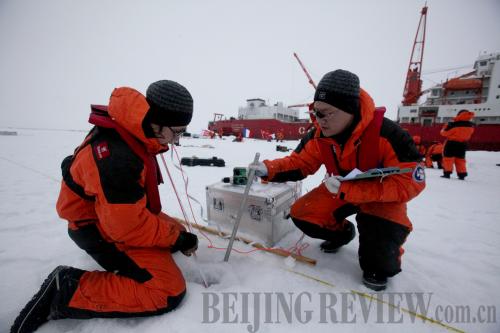|
 |
|
ARCTIC EXPLORERS: Two members of China's expedition team measure sea ice depth on August 29, 2012 at a spot near the country's short-term research station in the floating ice zone of the Arctic Ocean (QU JING) |

In recent years, the Arctic Council has continued accelerating institutional development to cope with a host of challenges posed by hastening climate change. It is in the midst of a transformation from a policy-focused high-level governmental forum to a decision-making organization.
The Arctic Council Standing Secretariat was established on January 21 in Norway's northern city of Tromso. The secretariat, with a secretary general and 10 members, is responsible for supporting the Arctic Council and strengthening communication and coordination on Arctic affairs. Last November, Magnus Johannesson, Secretary General of the Ministry for the Environment of Iceland, was appointed as the first director of the secretariat. Now the Arctic Council has largely established itself as an international organization as defined by international law, with a three-tier structure of a supreme authority (the biennial ministerial meeting), an executive body (the biannual senior officials' meeting) and a day-to-day administrative body (the Standing Secretariat).
Institutional development
The Arctic Council was founded in 1996 as a positive development following the end of the Cold War. The eight countries that have territory in the Arctic area—the United States, Russia, Canada, Sweden, Finland, Iceland, Norway and Denmark—hope that through the council they will be able to carry out practical cooperation on environmental protection and sustainable development in the area. Compared with normal international organizations, the Arctic Council's advantage rests more on the organization's powerful and authoritative ability of research and assessment rather than its decision-making influence. The council usually expresses its concerns to the international community by issuing a series of assessment reports based on scientific research. For example, the Arctic Climate Impact Assessment and the Arctic Marine Shipping Assessment have greatly promoted Arctic governance.
The Arctic Climate Impact Assessment issued in 2004 significantly changed public perception of the Arctic as a frozen desert. People began to realize that the region has giant economic potential in its ample resources, suggesting that stricter governance measures should be introduced. As part of the achievements brought by the Arctic Marine Shipping Assessment released in 2009, the Arctic Council has urged its members to coordinate their actions and design a whole set of compulsory navigation rules applying to the extreme environment of the Arctic. Currently, the legal work of rule-making is being carried out under the framework of the International Maritime Organization, and there are hopes for a breakthrough in the next two years.
Climate change and environmental protection are the two major focuses of the Arctic Council. Moreover, the council will strengthen agreements on search and rescue operations, navigation rules and large-scale resource development in the future to improve its administrative structure. The above-mentioned eight countries signed an agreement on cooperation for sea and air search and rescue in the Arctic in 2011. The document is the first international convention with a formal legal effect since the Arctic Council was set up. The agreement did not make any solid breakthroughs from the perspective of international law because it can neither influence internal legislation of the Arctic countries, nor force the member states of the council to promote their search and rescue ability or add new resources. However, it has cemented a solid basis for strengthening Arctic administration and cooperation and set an example for managing similar future agreements. Therefore, it effectively enhances the council's credibility and capacity of implementing agreements.
|
